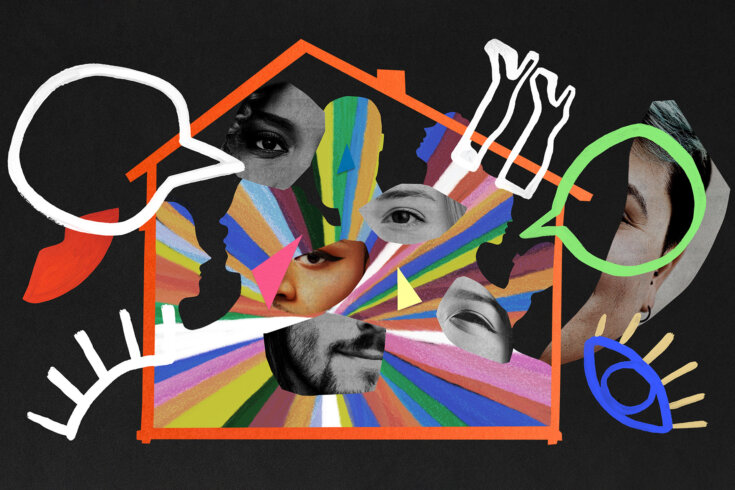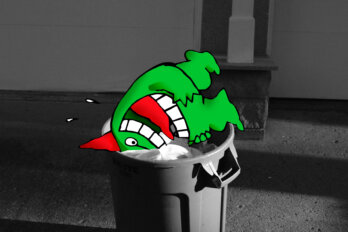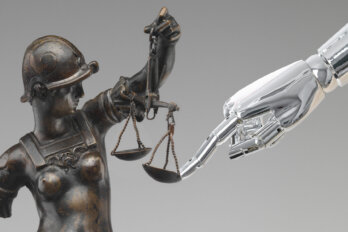Ika Wong steps into the Big Brother Canada backyard, blithely unaware she’s about to become an icon. She finds two tables laid with objects of immense value in the Big Brother house. The one to the left has a huge sign that says “Letters from Home.” On the other table is an oversized cheque, made out to Wong, for the sum of $5,000. Beside the cheque sits a black shredder.
Wong and her eleven housemates have been cooped up in a mansion in Toronto for the past month, their every move filmed by hidden cameras and livestreamed on the internet. They have not spoken with their loved ones or had any contact with the world outside the house. They have been busy plotting each other’s demise, hoping to vote out their housemates before they themselves are voted out. Big Brother Canada (BBCAN ) is a zero-sum game requiring social acrobatics—making people like you, persuading them you’re not a threat, and then turning on them when it best suits you. The last person standing will win $100,000.
Wong now has a game-changing opportunity: try to win the hearts and minds of her fellow contestants or cut her losses—she’s despised by most of her housemates and unlikely to survive the week—and take the money. She deliberates for a few minutes before lunging at a letter and plunging it into the shredder’s jaws. The machine’s gears churn wildly. She shoves the rest of the letters in, kicking at the air and tossing off curse words. Her face twists into a merciless grin, and she begins to laugh, unable to contain her glee.
In the end, Wong’s decision culminated in her elimination, making her an early boot on Big Brother Canada’s second season. But “the shredding” itself went viral, becoming one of the show’s most memorable moments, and was early evidence that Big Brother Canada could play in the reality TV big leagues, successfully adapting the genre’s formula—interesting people plus uncomfortable circumstances equals spontaneous entertainment—in a way other Canadian spinoffs (Canadian Idol, Canada’s Got Talent, Canada’s Next Top Model ) never managed to.
Over 3 million people tuned in to the series premiere, which debuted on Slice, a cable channel aimed at women. It was Slice’s biggest broadcast to date and the most watched entertainment show (a category that includes sitcoms, talk shows, and dramas) on Canadian television on the nights that it aired. Shaw Media, which owned Slice at the time, announced that, within several weeks, one in six Canadians had seen the show, and Slice enjoyed a 77 percent increase in viewership during BBCAN ’s first season. For its third season, the show moved from Slice to the heavy hitter Global. Its eleventh season debuts on March 8.
“We are without a doubt the most EXTRA show in Canada,” Arisa Cox, the show’s host and one of its executive producers, tells me in an email. Cox has been integral to the show’s success, not only because of her enthusiasm but also her extensive experience in Canadian television. She was a cast member on the 2001 debut season of U8TV: The Lofters, the first reality TV show to air nationally in Canada (on Slice’s predecessor, the Life Network) and live on the internet, in which eight young people lived together in a downtown Toronto loft. Cox, who studied journalism at Carleton University and worked as an arts and entertainment reporter after her stint on The Lofters, jumped at the opportunity to host BBCAN. “I knew that we had no choice but to come out of the gate breathing fire,” she says.
Big Brother Canada airs three times a week, and Cox hosts live evictions on Thursdays. The show draws on the melodrama of its American counterpart, and from the first season, there have been vicious exchanges, steamy romances, and, most importantly, backstabbing galore. But Big Brother Canada builds in a distinctly less self-serious spice, with wacky competitions such as “100 Minutes of Hell,” where contestants lie in a glass coffin for an hour and a half and endure a variety of unpleasantries, including mealworms being released onto their bodies. And unlike the American version of the show, which stocks its casts with conventionally attractive twenty-somethings who seem more interested in exposure than victory, Big Brother Canada recruits house guests who throw themselves into the game and allow themselves to get hurt. True, the show still emphasizes hackneyed pranks and wild twists, but by underscoring the vulnerability of its contestants and the complexities of their relationships, Big Brother Canada raises the “real” quotient in reality TV. Its finest attribute is its throbbing heart, which pulses through the melodrama.
I remember watching Big Brother Canada when it first aired. I was a very lonely and confused fourteen-year-old, and the American version of Big Brother had always been a means of escape for me. I could pretend I was popular. I could escape my loneliness. But reality TV became about much more than staving off solitude after that first season of Big Brother Canada because of one cast member: Gary Levy.
Levy was unlike anybody I’d ever seen before. He forsook gender roles, cloaking himself in blouses and pashminas. He walked around with a smattering of glitter around his eyes at all times, towered over the other house guests in high heels, and generally occupied more space than he should have. And despite sticking out like a glamorous thumb among his straight-presenting cast mates, he very nearly won the whole game.
This was at a time when the pinnacle of gay representation on TV was Modern Family, where queerness was celebrated but the show’s most feminine character, Cam, was often the butt of the joke. Watching Levy be himself was eye opening and legitimizing. It made me think maybe I could rid myself of my shame and embrace myself wholeheartedly, just like him.
For most of its history, reality television has tokenized people who aren’t white or straight or cisgender, seeming to take a one-of-each per season approach to its casting practices: one of each non-white race, one gay person, and maybe a trans person once a decade. Those people are then presented as caricatures of themselves and eliminated early. If you’re visibly different than the majority, your luck runs thin quick.
Cox, who is Black, was the lone person of colour cast on The Lofters during her season. Afterward, she says, “I watched as our population in Canada became more and more diverse, but often still found myself one of the only (if not THE only) Black women in more casts, newsrooms, assignment meetings and boardrooms than I can count.” She adds: “All of the colours and flavours of people around me in my actual life were rarely seen in Canadian TV on either side of the camera. I could only dream of a future that looked different.”
In 2020, Cox assumed an executive producer role for the show in addition to her hosting duties, and in advance of Big Brother Canada ’s ninth season, she announced that at least half of its casts moving forward would comprise contestants who were Black, Indigenous, or people of colour. At that point, only one person of colour had won Big Brother Canada: Paras Atashnak, season six’s champion. On the American franchise, only three of the show’s twenty-two winners had not been white.
Big Brother Canada season nine aired from March to May 2021 and produced the first Black winner in non-celebrity, North American Big Brother history: Tychon Carter-Newman, who parlayed his immense charisma into strategy, blindsiding his closest allies while endearing himself to the jury. (The jury on Big Brother consists of evicted house guests who ultimately pick the winner.) He took Breydon White to the final two, the first all-Black final two in the show’s history—guaranteeing that a Black person would take home the grand prize. Carter-Newman tells me this was partly strategic—he didn’t think White was strong enough to beat him. But he also knew that having White finish beside him would be a powerful endorsement of the show’s new mandate.
Shortly after BBCAN adopted its new mandate, CBS, the American network which airs Big Brother, Survivor, and The Amazing Race, did the same. A few months after Carter-Newman won BBCAN ’s season nine, an all-Black alliance called The Cookout stomped on the twenty-third season of Big Brother, which culminated in Xavier Prather becoming the US show’s first Black winner. “Seeing a Black winner in both the Canadian and American seasons was impactful for everyone,” says Carter-Newman. “Big Brother is a microcosm of real life. It shows us a glimpse of what society actually is.”
And that’s not always pretty. Take Big Brother, season twenty-four. Taylor Hale, who ultimately won, was instantly ostracized by the other house guests. She was repeatedly called a “bitch,” labelled “aggressive,” and nominated for eviction six times despite her warm disposition and demonstrable, consistent kindness. Although she was not the only Black woman in the house, Hale had the darkest skin, and viewers were quick to draw a parallel between the ways she was treated on Big Brother and the ways Black women are treated in the real world.
“You might have heard of the idea of microaggressions and how they might impact somebody, but you probably will never have the opportunity to actually see this, from start to finish,” says Taran Armstrong, a popular American reality TV podcaster.
Big Brother puts human behaviour under a microscope: how we lie, cheat, and steal for selfish ends and how sometimes we harm each other in ways we’re not aware of. We get to see the cast members do and feel things that we do and feel in our own lives—even things we may be ashamed of—from behind the shield of the screen. We get to learn from their mistakes.
Watching season ten of BBCAN, I found myself most compelled by two house guests: Betty Yirsaw and Josh Nash. They were an instant duo in the house—Nash was charming and suave with big golden retriever eyes, while Yirsaw was cutting and hilarious, real with everyone and loyal to a fault. As the two became close, Yirsaw asked Nash to come to her wedding. They appeared inseparable. But Nash’s desire to go down as a great player, and to win the game, overtook his relationship with Yirsaw, and at the end of the game, he cast a deciding vote to evict her, devastating Yirsaw. Nash was apparently punished for his betrayal; the jury handed the win to somebody else. But he did get one juror’s vote: Yirsaw’s.
Big Brother Canada invested significant airtime in the connection between Yirsaw and Nash as it developed, not knowing whether either would be a contender for the win. This epitomizes BBCAN ’s unique take on reality TV, finding and focusing on the realer-life moments that happen within and between contestants. I care more about the cast members on BBCAN than I do about those on any other show. When Nash broke Yirsaw’s heart, he broke mine too.
Fiction, with its bare insights into characters’ inner lives, allows us to learn more about one another, mitigating our isolation and refining our empathic abilities. Reality television offers something similar: an opportunity to learn about the lives of the human beings we actually share this world with. Maybe we see ourselves in Carter-Newman or Levy, or in Yirsaw or Nash, even if they’re people we’d likely never meet. “Sometimes it’s beautiful,” says Cox, “sometimes it’s ugly and the real people who open their lives and vulnerabilities to us all make it all the more meaningful.”






